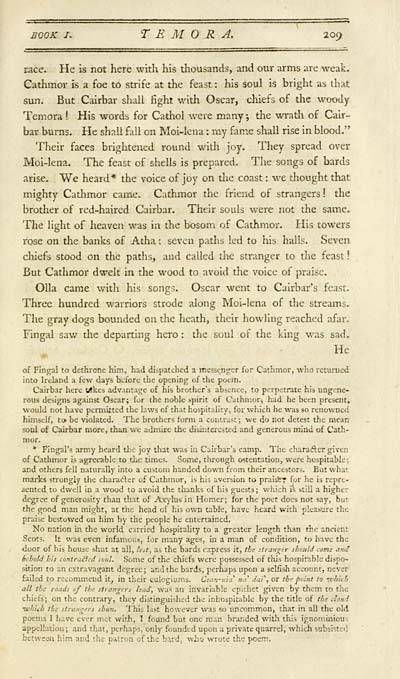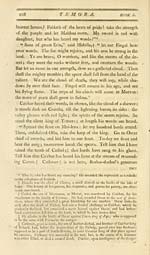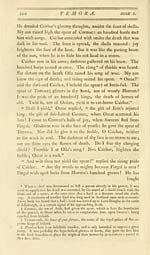Download files
Complete book:
Individual page:
Thumbnail gallery: Grid view | List view

T E M R A. 209
race. He is not here vnt\\ his thousands, and our arms are weak.
Cathmor is a foe to strife at the feast : his soul is bright as that
sun. But Cairbar shall fight with Oscar, chiefs of the woody
Temora I His words for Cathol were many ; the wratli of Cair-
bar burns. He shall fall on Moi-lena : my fame shall rise in blood."
Tlieir faces brightaied round witli joy. They spread over
Moi-lena. The feast of shells is prepared. The songs of bards
arise. We heard* the voice of joy on the coast : we tliought that
mighty Cathmor came. Cathmor the friend of strangers! the
brother of red-haired Cairbar. Their souls were not the same.
The light of heaven was in the bosom of Cathmor. His towers
i-ose on the banks of Atha : seven patlis led to his halls. Seven
cliiefs stood on the paths, and called the stranger to the feast !
But Cathmor dwelt in the wood to avoid the voice of praise.
Olla came with his songs. Oscar went to Cairbar's feast.
Three hundred warriors strode along Moi-lena of the streams.
The gray dogs bounded on the heath, their howling reached afar.
Fingal saw the departing hero : the soul of the king was sad.
He
of Fing;ai to dethrone him, had dispatched a messeno^er for Cathmor, who returned
into Ireland a few days before the opening of the poem.
Cairbar here tikes adv.mtage of his brother's absence, to perpetrate his ungene-
rous designs against Oscar; for the noble spirit of Cuthmorj had he been present,
would not have permitted the laws of that hospitality, for which he was so renowned
himself, ti> be violated. The brothers torm a contr^ist ; we do not detest the mean
soul of Cairbar more, than we admire the disinterested and generous mind of Cath-
mor.
* Fingal's army heard the joy that was in Cairbar's camp. The charafter given
of Cathmor is agreeable to tlie times. Some, through ostentation, were hospitable;
and others fell naturally into a custom handed down from their ancestors. But what
marks strongly tlie charatler of Cathmor, is his aversion to praisfc^ for he is repre-
sented to dwell in a wood to avoid the thanks of his guests; which ili still a higher
degree of generosity than that of Arj'lus in Homer; for the poet does not say, but
the good man might, at the head of his own table, have heard with pleasure the
praise bestowed on him by the people he entertained.
No nation in the world carried hospitality to a greater length than the ancient
Scots. It was even infamous, for many ages, in a man of condition, to have the
door of his house shut at all, lejt, as the bards express it, the stranger should come and
behold his contralied soul. Some of the chiefs were possessed of this hospitable dispo-
sition to an extravagant degree; and the bards, perhaps upon a selfish account, never
failed to recommend it, in their eulogiums. Cea'i-uia na dai', or the pdnt to tvhul}
all the roads of the strangers lead, wa' an invariable epidiet given by them to the
chiefs; on the contrary, they distinguished the inhospitable by the title of the cloud
•which the strangers shun. I'his last however was SO uncommon, that in all the old
poems I have ever met with, I found but one man branded with this ignominious
appellation; and that, perhaps, only founded upon a private quarrel, which subsisted
bttw-ca him and the patron of the b?,rd, who wrote the poem.
race. He is not here vnt\\ his thousands, and our arms are weak.
Cathmor is a foe to strife at the feast : his soul is bright as that
sun. But Cairbar shall fight with Oscar, chiefs of the woody
Temora I His words for Cathol were many ; the wratli of Cair-
bar burns. He shall fall on Moi-lena : my fame shall rise in blood."
Tlieir faces brightaied round witli joy. They spread over
Moi-lena. The feast of shells is prepared. The songs of bards
arise. We heard* the voice of joy on the coast : we tliought that
mighty Cathmor came. Cathmor the friend of strangers! the
brother of red-haired Cairbar. Their souls were not the same.
The light of heaven was in the bosom of Cathmor. His towers
i-ose on the banks of Atha : seven patlis led to his halls. Seven
cliiefs stood on the paths, and called the stranger to the feast !
But Cathmor dwelt in the wood to avoid the voice of praise.
Olla came with his songs. Oscar went to Cairbar's feast.
Three hundred warriors strode along Moi-lena of the streams.
The gray dogs bounded on the heath, their howling reached afar.
Fingal saw the departing hero : the soul of the king was sad.
He
of Fing;ai to dethrone him, had dispatched a messeno^er for Cathmor, who returned
into Ireland a few days before the opening of the poem.
Cairbar here tikes adv.mtage of his brother's absence, to perpetrate his ungene-
rous designs against Oscar; for the noble spirit of Cuthmorj had he been present,
would not have permitted the laws of that hospitality, for which he was so renowned
himself, ti> be violated. The brothers torm a contr^ist ; we do not detest the mean
soul of Cairbar more, than we admire the disinterested and generous mind of Cath-
mor.
* Fingal's army heard the joy that was in Cairbar's camp. The charafter given
of Cathmor is agreeable to tlie times. Some, through ostentation, were hospitable;
and others fell naturally into a custom handed down from their ancestors. But what
marks strongly tlie charatler of Cathmor, is his aversion to praisfc^ for he is repre-
sented to dwell in a wood to avoid the thanks of his guests; which ili still a higher
degree of generosity than that of Arj'lus in Homer; for the poet does not say, but
the good man might, at the head of his own table, have heard with pleasure the
praise bestowed on him by the people he entertained.
No nation in the world carried hospitality to a greater length than the ancient
Scots. It was even infamous, for many ages, in a man of condition, to have the
door of his house shut at all, lejt, as the bards express it, the stranger should come and
behold his contralied soul. Some of the chiefs were possessed of this hospitable dispo-
sition to an extravagant degree; and the bards, perhaps upon a selfish account, never
failed to recommend it, in their eulogiums. Cea'i-uia na dai', or the pdnt to tvhul}
all the roads of the strangers lead, wa' an invariable epidiet given by them to the
chiefs; on the contrary, they distinguished the inhospitable by the title of the cloud
•which the strangers shun. I'his last however was SO uncommon, that in all the old
poems I have ever met with, I found but one man branded with this ignominious
appellation; and that, perhaps, only founded upon a private quarrel, which subsisted
bttw-ca him and the patron of the b?,rd, who wrote the poem.
Set display mode to: Large image | Transcription
Images and transcriptions on this page, including medium image downloads, may be used under the Creative Commons Attribution 4.0 International Licence unless otherwise stated. ![]()
| Early Gaelic Book Collections > Ossian Collection > Poems of Ossian, the son of Fingal > (221) |
|---|
| Permanent URL | https://digital.nls.uk/77925884 |
|---|
| Description | Selected books from the Ossian Collection of 327 volumes, originally assembled by J. Norman Methven of Perth. Different editions and translations of James MacPherson's epic poem 'Ossian', some with a map of the 'Kingdom of Connor'. Also secondary material relating to Ossianic poetry and the Ossian controversy. |
|---|
| Description | Selected items from five 'Special and Named Printed Collections'. Includes books in Gaelic and other Celtic languages, works about the Gaels, their languages, literature, culture and history. |
|---|

